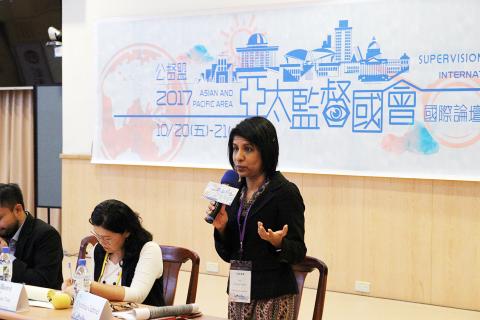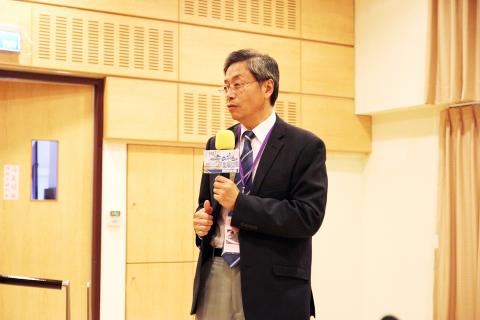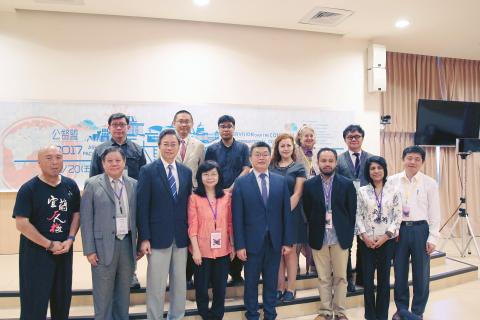The legislature needs to find ways to make it more appealing for the public to keep track of what it does, panelists said at Supervision over the Congress International Conference.
“We need to remember, not everyone is a political animal,” said Shih Hsin-min (施信民), former chairman of Citizen Congress Watch.
The conference, which was held at Soochow University last Friday and Saturday and brought together academics from across the Asia-Pacific region, was a lively discussion on a timely topic that aired concepts of government transparency as varied as the backgrounds of the speakers themselves.

Photo Courtesy of CITIZEN Congress watch
The government is planning to have comments appear on the Web site in real time, so that the public can share their thoughts and feedback on the legislative session, former premier Simon Chang (張善政) said.
Shih said creating a system that ranks the best parts of legislative sessions would make it more appealing to the public.
“A viewer rating system could allow users to judge the quality of dialogue,” Chang added.

Photo Courtesy of CITIZEN Congress watch
TRANSPARENCY AND DEVELOPMENT
Guest speaker Cynthia Gabriel, founder of the Center to Combat Corruption and Cronyism, is based in Malaysia and sees government transparency as pivotal for the region’s development.
“If parliament is not monitored and held accountable, we’ll have a case of creeping authoritarianism,” she said, citing the 1Malaysia Development Berhad corruption scandal which has mired Malaysian Prime Minister Najib Razak in controversy in recent months.

Photo Courtesy of CITIZEN Congress watch
“The entire scandal has engulfed the nation,” she added. “He [Razak] is using public institutions to protect himself and his private interests.”
Gabriel said this is a serious transgression that has threatened parliamentary immunity.
“Even though [the Malaysian government] is hiding information from Malays, other neighboring countries are investigating,” she said.
Fellow guest speaker Donal Fariz, from Indonesian Corruption Watch, said sharing experiences is key to better understanding the common challenge of corruption.
“Corruption is a transnational crime,” he said.
NEW SOUTHBOUND POLICY
Gabriel added that in a globalized world, citizens of other countries have a role to play in exposing the corruption of other governments, particularly those within one’s own region.
“The nexus between business and politics is an important one,” Gabriel said, in response to a question regarding Taiwan’s New Southbound Policy and government transparency.
“Taiwan is disadvantaged geo-politically... Although it’s track record is by no means perfect, it defends it’s democratic values and must espouse them when it does business abroad,” she said.
Fariz said he meets a lot of Taiwanese business people in his hometown of Jakarta these days, attracted by the infrastructure projects kicked off by current Indonesian President Joko Widodo.
“Transparency combats corruption and a corruption-free environment is the foundation for investment,” Fariz said. “That’s why it’s so critical.”
HISTORICAL EXCEPTIONS
Linda Gail Arrigo, an assistant professor at Taipei Medical University’s College of Humanities and Social Sciences, attended the conference to raise concerns over what she sees as the government’s misuse of privacy laws in blocking the release of historical records.
In response, Chang said this may be a case where the legal statutes conflict.
“There is considerable resistance on the part of government ministries,” Arrigo said. “Even if they are released,” Arrigo added, “the names on the photocopies are always blacked out.”
The level of government transparency for the present day has improved considerably, she said, but the past remains convoluted and this makes transitional justice impossible.
“How can we refute denials of the 228 Incident if we can’t access the records?” Arrigo said.

Climate change, political headwinds and diverging market dynamics around the world have pushed coffee prices to fresh records, jacking up the cost of your everyday brew or a barista’s signature macchiato. While the current hot streak may calm down in the coming months, experts and industry insiders expect volatility will remain the watchword, giving little visibility for producers — two-thirds of whom farm parcels of less than one hectare. METEORIC RISE The price of arabica beans listed in New York surged by 90 percent last year, smashing on Dec. 10 a record dating from 1977 — US$3.48 per pound. Robusta prices have

The resignation of Taiwan People’s Party (TPP) co-founder Ko Wen-je (柯文哲) as party chair on Jan. 1 has led to an interesting battle between two leading party figures, Huang Kuo-chang (黃國昌) and Tsai Pi-ru (蔡壁如). For years the party has been a one-man show, but with Ko being held incommunicado while on trial for corruption, the new chair’s leadership could be make or break for the young party. Not only are the two very different in style, their backgrounds are very different. Tsai is a co-founder of the TPP and has been with Ko from the very beginning. Huang has

A few years ago, getting a visa to visit China was a “ball ache,” says Kate Murray. The Australian was going for a four-day trade show, but the visa required a formal invitation from the organizers and what felt like “a thousand forms.” “They wanted so many details about your life and personal life,” she tells the Guardian. “The paperwork was bonkers.” But were she to go back again now, Murray could just jump on the plane. Australians are among citizens of almost 40 countries for which China now waives visas for business, tourism or family visits for up to four weeks. It’s

A dozen excited 10-year-olds are bouncing in their chairs. The small classroom’s walls are lined with racks of wetsuits and water equipment, and decorated with posters of turtles. But the students’ eyes are trained on their teacher, Tseng Ching-ming, describing the currents and sea conditions at nearby Banana Bay, where they’ll soon be going. “Today you have one mission: to take off your equipment and float in the water,” he says. Some of the kids grin, nervously. They don’t know it, but the students from Kenting-Eluan elementary school on Taiwan’s southernmost point, are rare among their peers and predecessors. Despite most of